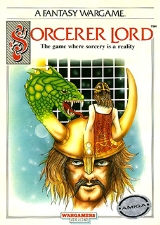
Sorcerer Lord
Encyclopedia
Sorcerer Lord is turn based strategy-fantasy game published and developed by now defunct Personal Software Services
. It was first released in 1987 for ZX Spectrum
and Amstrad CPC
. During next 2 years game was also released for Commodore 64
, Atari ST
, MS-DOS
and Amiga
.
During the game, the human player and the computer take turns to recruit and move troops on a 2D map. The aim of the game for the Sorcerer Lord is to resist the initial attack of the Shadowlords' army and prevent him from holding any Galanor city or any magical Rune Rings for more of 11 days . The game is lost if the Shadowlord takes Galanor's capital city.
The strategy element of the game is enhanced by the unique abilities of soldiers from the different kingdoms. For example, mountain warriors have the advantage of a siege bonus and whilst fighting on mountainous terrain, and some higher ranking human leaders have a magic bonus. Movement bonuses also depend on the terrain; for example Elves can move faster in the forest, whereas barbarians can move faster in desert areas.
The game has a limit of 40 moves in the easy level, and fewer moves in the higher levels.
gave the game a positive review, calling it a "fantasy wargamer's delight", albeit a very difficult game. The review noted the exclusive use of the numeric keys for movement made it easy to make mistakes with. The review also lamented the simple victory message upon winning or losing the game.
Personal Software Services
Personal Software Services was a British software company based in Coventry, founded by Gary Mays and Richard Cockayne in 1981. The company was acquired by Mirrorsoft in 1987....
. It was first released in 1987 for ZX Spectrum
ZX Spectrum
The ZX Spectrum is an 8-bit personal home computer released in the United Kingdom in 1982 by Sinclair Research Ltd...
and Amstrad CPC
Amstrad CPC
The Amstrad CPC is a series of 8-bit home computers produced by Amstrad between 1984 and 1990. It was designed to compete in the mid-1980s home computer market dominated by the Commodore 64 and the Sinclair ZX Spectrum, where it successfully established itself primarily in the United Kingdom,...
. During next 2 years game was also released for Commodore 64
Commodore 64
The Commodore 64 is an 8-bit home computer introduced by Commodore International in January 1982.Volume production started in the spring of 1982, with machines being released on to the market in August at a price of US$595...
, Atari ST
Atari ST
The Atari ST is a home/personal computer that was released by Atari Corporation in 1985 and commercially available from that summer into the early 1990s. The "ST" officially stands for "Sixteen/Thirty-two", which referred to the Motorola 68000's 16-bit external bus and 32-bit internals...
, MS-DOS
MS-DOS
MS-DOS is an operating system for x86-based personal computers. It was the most commonly used member of the DOS family of operating systems, and was the main operating system for IBM PC compatible personal computers during the 1980s to the mid 1990s, until it was gradually superseded by operating...
and Amiga
Amiga
The Amiga is a family of personal computers that was sold by Commodore in the 1980s and 1990s. The first model was launched in 1985 as a high-end home computer and became popular for its graphical, audio and multi-tasking abilities...
.
Game
The game is set in the fictional land of Galanor. Galanor contains three human kingdoms, a forest kingdom of elves, a kingdom of barbarians and two kingdoms of mountain warriors. An invading army commanded by the evil sorcerer, the Shadowlord, is controlled by the computer. The player takes on the role of the Sorcerer lord and must use the forces of the Galanor Alliance under his command to counter this attack.During the game, the human player and the computer take turns to recruit and move troops on a 2D map. The aim of the game for the Sorcerer Lord is to resist the initial attack of the Shadowlords' army and prevent him from holding any Galanor city or any magical Rune Rings for more of 11 days . The game is lost if the Shadowlord takes Galanor's capital city.
The strategy element of the game is enhanced by the unique abilities of soldiers from the different kingdoms. For example, mountain warriors have the advantage of a siege bonus and whilst fighting on mountainous terrain, and some higher ranking human leaders have a magic bonus. Movement bonuses also depend on the terrain; for example Elves can move faster in the forest, whereas barbarians can move faster in desert areas.
The game has a limit of 40 moves in the easy level, and fewer moves in the higher levels.
Reception
Computer Gaming WorldComputer Gaming World
Computer Gaming World was a computer game magazine founded in 1981 by Russell Sipe as a bimonthly publication. Early issues were typically 40-50 pages in length, written in a newsletter style, including submissions by game designers such as Joel Billings , Dan Bunten , and Chris Crawford...
gave the game a positive review, calling it a "fantasy wargamer's delight", albeit a very difficult game. The review noted the exclusive use of the numeric keys for movement made it easy to make mistakes with. The review also lamented the simple victory message upon winning or losing the game.

